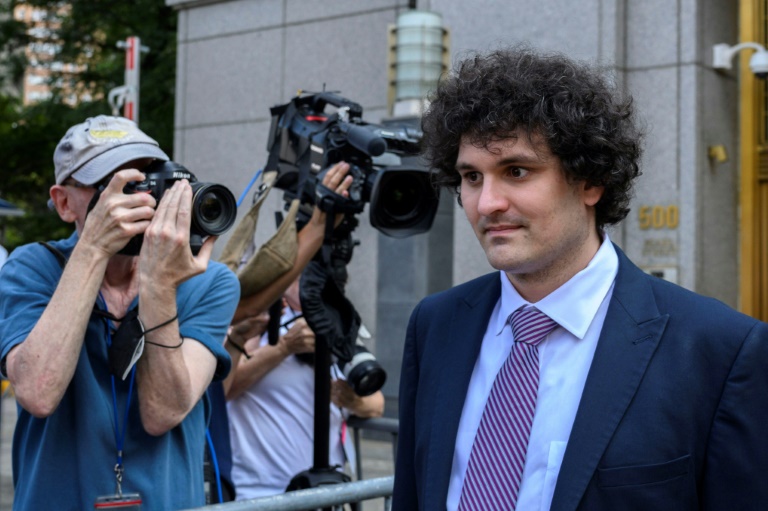Cryptocurrency genius Sam Bankman Fried is set to be sentenced on Thursday after being found guilty in one of the biggest financial fraud cases in history.
US prosecutors are seeking 40 to 50 years in prison after a New York jury found Bankman-Fried, known by his initials SBF, guilty in November, after a five-week trial that investigated the spectacular one-time fall. .
Bankman-Fried's conviction on seven counts reflects the defendant's “unparalleled greed and arrogance,” and the government's sentencing request calls for a lengthy prison sentence in light of the fraud the government estimates at more than $10 billion.
Moreover, the lengthy sentence is necessary to “protect the public,” said U.S. Attorney Damian Williams, who described Bankman-Fried as “seasoned” capable of committing more offenses.
If he were released quickly, Williams said in a 113-page legal filing, “it is realistic that he will settle on a narrative, lean into it, and convince other people to part with their money based on lies and the promise of false hope.” Accompanied by the testimonies of dozens of victims.
Bankman-Fried's lawyers called the government's proposed sentence “barbaric” and portrayed their client as a hardworking young man driven by philanthropy.
Their portrayal is similar to the defense SBF presented at trial — which jurors quickly rejected after just five hours of deliberations.
Lawyers led by Mark Mukasey said Bankman-Fried, 32, should serve about six years in prison, a sentence that “immediately returns Sam to a productive role in society.”
The final ruling will be carried out by U.S. District Judge Lewis Kaplan. Bankman-Fried will be given an opportunity to address the court before sentencing.
– FTX Explosion –
An MIT graduate and a billionaire before the age of 30, Bankman-Fried conquered the world of cryptocurrencies with dizzying speed, turning FTX, a small startup he co-founded in 2019, into the world's second-largest exchange.
But in November 2022, the FTX empire collapsed, unable to handle massive withdrawal requests from clients who panicked when they learned that some of the money stored at the company was committed to risky operations at Bankman-Fried's personal hedge fund, Alameda Research.
During the trial, some of Bankman-Fried's closest associates said he was key to all the decisions that led to the disappearance of $8 billion from FTX.
This group included Carolyn Ellison, Alameda's former CEO and Bankman-Fried's on-off girlfriend, who testified that Alameda stole “about $14 billion” from FTX customers and that Bankman-Fried “ordered me to commit those crimes.”
Prosecution and defense briefs offered starkly different opinions from Bankman-Fried, the son of two distinguished Tony Stanford law professors.
Williams, who objected to the image of Bankman-Fried as “selfless” and “altruistic”, as defended by the defence, said that “the lack of remorse is disturbing”, noting that he had used money to buy “luxury” properties and donations to other projects. Rubbing shoulders with political leaders, Super Bowl TV commercials and “celebrity access.”
Bankman-Fried's defense statement describes him as “devastated” by remorse over FTX's collapse.
– Refunds –
Bankman-Fried's lawyers also pointed to statements from current FTX leaders expressing confidence that FTX's customers and creditors will get their money back, saying in the brief that “the harm to customers, lenders and investors is zero.”
The argument sparked a sharp response from FTX Trading CEO John Ray, who said constant clawbacks of ill-gotten gains do not make up for fraud.
“Just because the items he stole…were successfully recovered through the efforts of a specialized group” of professionals “does not mean the items were not stolen,” Ray said in a letter to the court.
“What it means is that we got some of them back.”
The recalls are unlikely to significantly impact the ruling, said Jacob Frenkel, an attorney with Dickinson Wright who previously worked at the Justice Department and the Securities and Exchange Commission.
“The determination of the ruling is not about returning speculative funds,” Frenkel said. “It's about what the fraud was when he was convicted.”
Frenkel said he would be “shocked” to be sentenced to less than 20 years in prison, in part because the judge needed to send a strong signal that fraud in the nascent cryptocurrency sector would be taken as seriously as any other.
JMP/NRO

